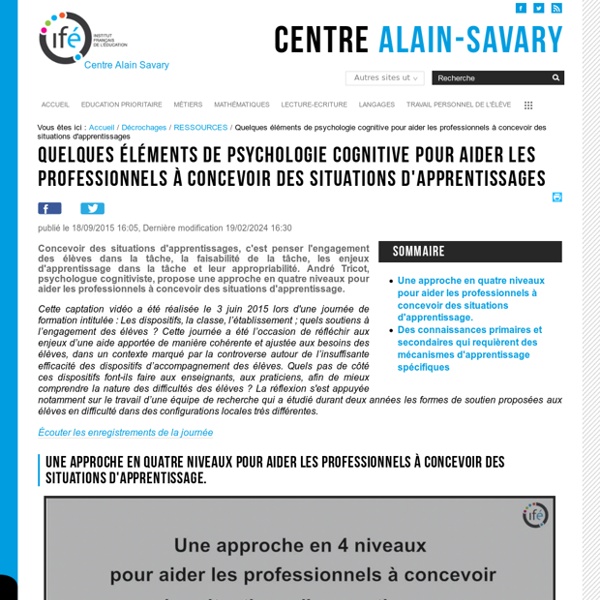



A longer piece on the taxonomy of Bloom Benjamin Bloom developed a taxonomy for goals in education, and frankly: One of the most asked questions I received is ‘is Bloom correct’. For the people who haven’t heard about the taxonomy before, it is often represented like this: But did you notice, I didn’t write: this is the taxonomy, I wrote it’s often represented. During Spring a lot of edubloggers wrote about this by the likes of David Didau and Doug Lemov and on Twitter Dylan William proposed this correction: 3 Modes Of Thinking: Lateral, Divergent & Convergent Thought - 3 Modes Of Thinking: Lateral, Divergent & Convergent Thought by TeachThought Staff TeachThought is about, more than anything else, human improvement. A core tenet of humanity is our ability to think critically and with imagination and creativity.
ISO 21001:2018(en), Educational organizations — Management systems for educational organizations — Requirements with guidance for use {* #socialRegistrationForm *} {* socialRegistration_firstName *} {* socialRegistration_lastName *} {* socialRegistration_emailAddress *} {* socialRegistration_displayName *} By clicking "Sign in", you confirm that you accept our terms of service and have read and understand privacy policy. {* /socialRegistrationForm *} Please confirm the information below before signing in. Already have an account? Sign In. {* #registrationForm *} {* traditionalRegistration_firstName *} {* traditionalRegistration_lastName *} {* traditionalRegistration_emailAddress *} {* traditionalRegistration_password *} {* traditionalRegistration_passwordConfirm *} {* traditionalRegistration_displayName *} By creating an account, you acknowledge and agree to our Privacy Policy. {* /registrationForm *} Sorry we could not verify that email address.
10 Things Every Teacher Should Know Before Starting Their First Day In The Classroom Are you a new teacher? Do you know a new teacher, or do you have new teachers on your staff this year? If so, I think you’ll find this valuable. It is my list of the top 10 things I believe every new teacher should know before they start their first day of teaching. The list is based on research on teacher attrition, input from respected colleagues and my own personal experience. Don’t believe everything you’ve been told.
Metacognition: Nurturing Self-Awareness in the Classroom How do children gain a deeper understanding of how they think, feel, and act so that they can improve their learning and develop meaningful relationships? Since antiquity, philosophers have been intrigued with how human beings develop self-awareness -- the ability to examine and understand who we are relative to the world around us. Today, research not only shows that self-awareness evolves during childhood, but also that its development is linked to metacognitive processes of the brain. Making Sense of Life Experiences Most teachers know that if students reflect on how they learn, they become better learners. For example, some students may think and process information best in a quiet library, while others may focus better surrounded by familiar noise or music.
Memory not memories – teaching for long term learning – primarytimerydotcom It seems like a life time ago but this time last week I should have been at ResearchEd, listening to great speakers and getting butterflies about my session later that day. Except that I slipped on the hardboard down on the kitchen floor courtesy of our kitchen refit and ended up in A&E instead. Luckily nothing is broken and my leg is slowly getting better. The neuroscience of attention and why instructional designers should know about it You know all those classic arguments couples have that begin with “I told you but you never listen!”? In truth, the listening part is not the issue, the remembering (or absence of) is the real problem. Paying attention is no easy thing and grabbing and holding someone’s attention is even trickier. A fairly recent study calculated that the average attention span of a person has dropped from twelve to eight seconds, rendering us below the focusing capabilities of goldfish.
Education sector to benefit from a new international management system standard From pre-school to university, to vocational training and coaching, the world of learning is constantly changing and evolving. As the trend to move away from the traditional customer-supplier relationship towards a collaborative partnership grows, so, too, do learners’ expectations. Learning providers now need to adapt to these new ways of working, while at the same time providing a high level of service. ISO 21001, Educational organizations – Management systems for educational organizations – Requirements with guidance for use, is intended to meet this challenge by defining the requirements of a management system that will help education providers better meet the needs and expectations of their learners and other beneficiaries, and demonstrate greater credibility and impact. Developed by project committee ISO/PC 2881), the new International Standard focuses on the specific interaction between an educational institution, the learner and other customers.
How to Give Effective Feedback to Your Students When John Hattie reviewed over 500,000 research studies, he found that feedback had more impact on student results than any other teaching strategy. By the time he conducted his latest review, published in Visible Learning, he had added an extra 300,000+ studies to his database, and feedback still comes out on top1. In all aspects of life, feedback is the breakfast of champions. It lets you know how you are going while also telling you how you can improve. You can use feedback to improve how well your students do at school.